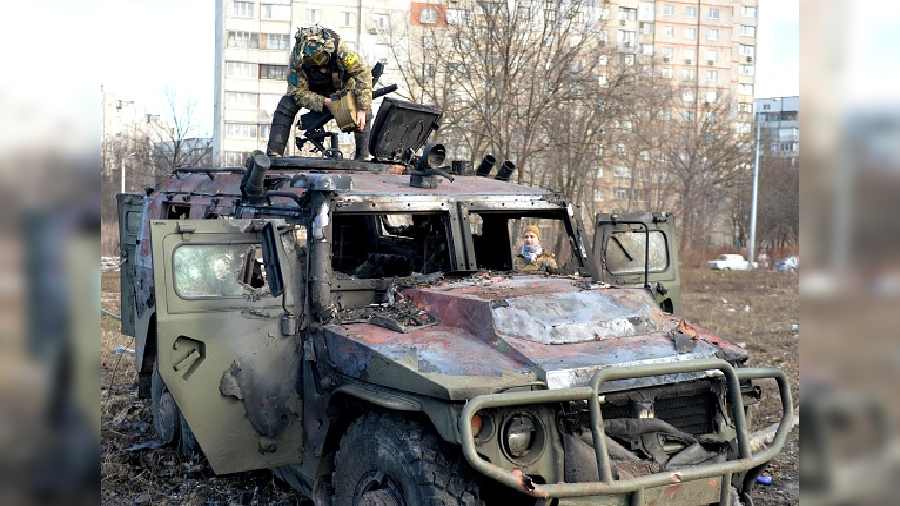Ukrainian forces battled Russian troops pushing into the city of Kharkiv on Sunday on the fourth day of an invasion that has shaken Europe’s long-standing security architecture.
The invasion of Ukraine from three sides ordered by Russian President Vladimir Putin is the biggest assault on a European state since World War II.
The attack, which Russia calls a special operation, has so far failed to topple the government in Kyiv or take major cities, but has driven hundreds of thousands of refugees, mainly women and children, into neighbouring countries.
Russian soldiers and armoured vehicles entered the northeastern city of Kharkiv and firing and explosions could be heard, witnesses said. A burning tank was visible in a video posted by the government.
Ukraine’s fighters repelled the attack, according to authorities in the city, the country’s second largest with a population of about 1.4 million people.
“Control over Kharkiv is completely ours! The armed forces, the police, and the defence forces are working, and the city is being completely cleansed of the enemy,” regional Governor Oleh Sinegubov said.
Reuters was unable to immediately corroborate the information.
The Russian troops blew up a natural gas pipeline in Kharkiv before daybreak, a Ukrainian state agency said, sending a burning cloud up into the darkness.
Both Ukraine’s gas pipeline operator and Kremlin-controlled energy giant Gazprom said the transit of Russian gas via Ukraine, vital for Europe’s energy needs, was unaffected.
Ukraine’s western allies ratcheted up their response to Russia’s land, sea and air invasion with an almost blanket ban on Russian airlines using European airspace.
In the strongest economic sanctions yet on Moscow, the United States and Europe said late on Saturday they would banish major Russian banks from the main global payments system and announced other measures aimed at limiting Moscow’s use of a $630 million war chest of central bank reserves.
Ukrainian forces were also holding off Russian troops advancing on the capital Kyiv, President Volodymyr Zelenskiy said. But shelling hit civilian infrastructure and targets including ambulances, he said.
“We have withstood and are successfully repelling enemy attacks. The fighting goes on,” Zelenskiy said in a video message from the streets of Kyiv posted on his social media.
Russian-backed separatists in the eastern province of Luhansk said a Ukrainian missile had blown up an oil terminal in the town of Rovenky.
A US defence official on Saturday said Ukraine’s forces were putting up “viable” resistance to Russia’s advance.
Casualties rise
Ignoring weeks of frantic diplomacy and sanctions threats by western nations seeking to avoid war, Putin has justified the invasion saying “neo-Nazis” rule Ukraine and threaten Russia’s security — a charge Kyiv and western governments say is baseless propaganda.
Ukraine, a democratic nation of 44 million people, won independence from Moscow in 1991 at the fall of the Soviet Union and has pushed to join the Nato western military alliance and the EU, goals Russia opposes.
Putin has said he must eliminate what he calls a serious threat to his country from its smaller neighbour, accusing it of genocide against Russian-speakers in eastern Ukraine — something Kyiv and its western allies reject as a lie.
The Kremlin sent a diplomatic delegation to neighbouring Belarus offering talks, but Ukraine rejected the offer.
Russian troops are believed to have entered Ukraine from Belarus, a close ally of Moscow. Ukraine was happy to hold talks elsewhere, Zelenskiy said.
At least 198 Ukrainians, including three children, have been killed in Russia’s invasion, the head of Ukraine’s health ministry was quoted as saying.
A United Nations agency reported 64 civilian deaths and a Ukrainian presidential adviser said about 3,500 Russian soldiers had been killed or wounded. Reuters was not able to verify the numbers. Western officials have said intelligence showed Russia suffering higher casualties than expected.
Russia has not released casualty figures and Reuters was unable to verify tolls or the precise picture on the ground.
Refugees flee fighting
A UN relief agency said more than 368,000 refugees, have crossed into neighbouring countries, clogging railways, roads and borders.
The US and its allies have authorised more weapons transfers to help Ukraine fight and imposed a range of sanctions on Russia in response to the assault, which threatens to upend Europe’s post-Cold War order.
On Saturday, they moved to block certain Russian banks’ access to the SWIFT international payment system, making it harder for Russia to trade and for its companies to do business.
They also said they would impose restrictions on Russia’s central bank to limit its ability to support the rouble and finance Putin’s war effort.
“We will hold Russia to account and collectively ensure that this war is a strategic failure for Putin,” the leaders of the European Commission, France, Germany, Italy, Britain, Canada and the United States said.
They did not name the banks that would be expelled. An EU diplomat said some 70 per cent of the Russian banking market would be affected.
Sanctions on Russia’s central bank could limit Putin’s use of the country’s more than $630 billion in reserves, widely seen as insulating Russia from some economic harm.
The Kremlin said its troops were advancing again in all directions and Putin thanked Russia’s special forces, singling out those who are “heroically fulfilling their military duty”.











